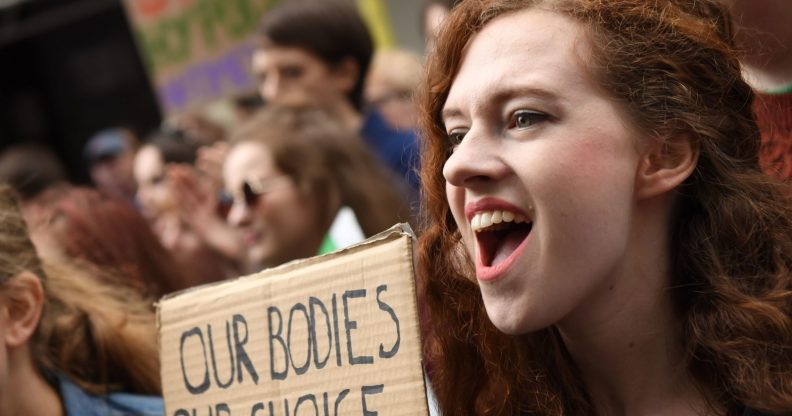After same-sex marriage referendum, Ireland sets date for referendum on abortion laws

Protesters hold up placards during the London March for Choice, calling for the legalising of abortion in Ireland after the referendum announcement, outside the Embassy of Ireland in central London on September 30, 2017.
Ireland is set to hold a landmark referendum on liberalising its abortion laws, three years after it became the first country in the world to legalise same-sex marriage by a national ballot.
The Irish government, led by Leo Varadkar, one of only two out gay world leaders, has confirmed that the country’s referendum on abortion will be held on Friday 25 May.
The country has some of the strictest abortion rules in the world, which are upheld in the Eighth Amendment of the Irish Constitution.
The date for a national vote follows the passing of the bill to hold the referendum in the Seanad (Irish Senate).

Ireland’s Prime minister Leo Varadkar (Photo by LUDOVIC MARIN/AFP/Getty Images)
Forty senators voted in favour of the bill with ten voting against.
On Tuesday, the government approved the main points of the law to be enacted if the referendum passes.
Voters will be asked if they want to repeal article 40.3.3, which since 1983 has given unborn foetuses and pregnant women an equal right to life, effectively banning abortion in the country’s constitution.
The health minister, Simon Harris, and housing minister, Eoghan Murphy , signed the order to set the date of the historic vote.

A mother and daughter await the start of a pro-choice demonstration through Belfast city centre (Getty)
“Whatever your views are on the proposals in the referendum, can I take this opportunity to encourage voters to go to their polling station during this 15-hour period on 25 May and have your say in the outcome of the referendum,” Murphy said.
Harris added: “It is really important that people do not sit at home and presume somebody else will make the decision for you.
“If you feel as strongly as we do that there needs to be change in this area, you need to come out and vote.”
The prime minister, Leo Varadkar of Fine Gael, a centre-right party, and the Fianna Fáil opposition leader, Micheál Martin, are backing a yes vote.

Protesters hold up placards as they take part in the March for Choice, calling for the legalising of abortion in Ireland after the referendum announcement, in Dublin on September 30, 2017.
Tens of thousands are expected at a rally for abortion rights in Dublin on September 30, campaigning on one side of a fierce debate after Ireland announced it will hold a referendum on the issue next year. / AFP PHOTO / Paul FAITH (Photo credit should read PAUL FAITH/AFP/Getty Images)
Martin surprised many in his party by changing his previous position and supporting abortion reform.
In 2015 Ireland voted for same-sex marriage by a margin of 62 percent in favour to 37 percent against.
The resounding success of progressive campaigners has seen a cultural shift in what was once one of the world’s most Catholic, conservative countries.
A poll for the Irish Times in January found that 56 percent of voters intend to back the reform.
Same-sex marriage and abortion laws are tied up in Ireland’s constitution meaning a national referendum is required to make changes.

